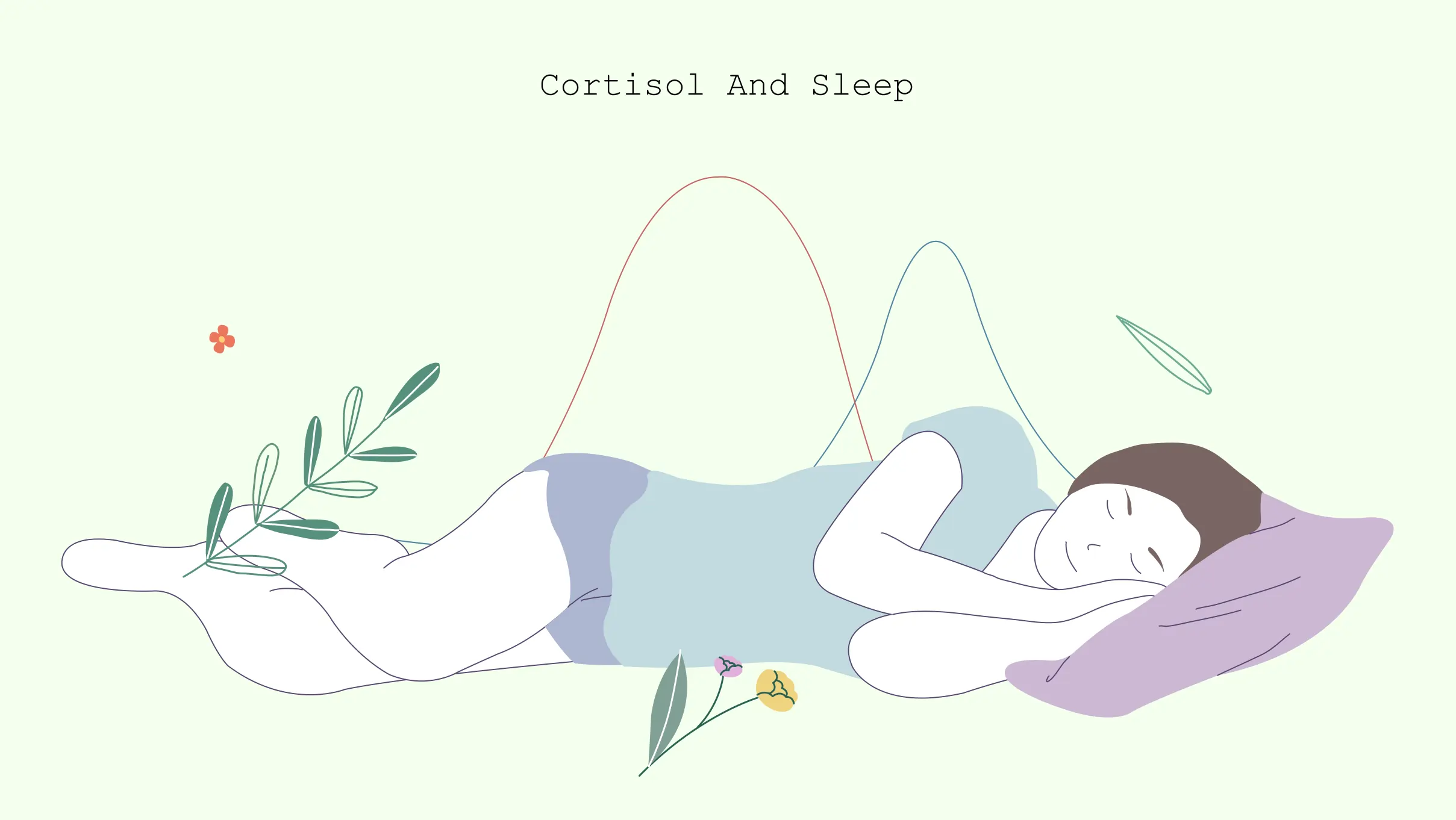Cortisol and Sleep: Everything You Need to Know
Written by


Have you ever wondered how you feel relieved after experiencing stress? It is because of cortisol. Cortisol is a stimulating and alerting hormone that helps manage the body’s functions, especially in relieving stress. In addition, cortisol and sleep have a deep connection because high cortisol leads to sleep deprivation and severe sleep disorders such as insomnia. Cortisol aids in controlling the sleep-wake cycle. How does a cortisol spike at night disrupt your sleep?
Read the article carefully to learn about the relationship between sleep and cortisol, what affects cortisol levels, and how to improve your cortisol levels.
What Is Cortisol
The adrenal glands produce and secrete the glucocorticoid hormone, “cortisol.” Glucocorticoids are a type of steroid hormone. Cortisol is a steroid hormone known as the body’s main stress hormone.
High cortisol and sleep deprivation are also interconnected because cortisol is a stimulating hormone. Since cortisol aids in managing various duties during the day, its level declines until bedtime. However, those with high cortisol at night experience sleep deprivation. Sometimes, it may lead to insomnia.
On the other hand, low cortisol (when your body doesn’t produce the required amount of cortisol) increases stress inside your body and may lead to serious chronic illnesses such as psychopathology. This will again affect your sleep as well as your body. Therefore, high or low cortisol and sleep deprivation are deeply connected.
What Does Cortisol Do
Cortisol has several functions that affect every organ and tissue in your body. It includes:
- Lowers internal stress levels
- Minimises inflammation
- Regulates the blood pressure of your body
- Helps the cardiac system function properly
- Increases your energy levels
- Helps in controlling the sleep-wake cycle
Everybody must have a balanced cortisol and sleep-wake cycle. Cortisol levels, higher or lower than usual, are harmful for your health. They also support diseases like high blood pressure, obesity, type 2 diabetes, and coronary artery disease.
What Does Cortisol Have to Do With Sleep
The HPA (hypothalamic-pituitary-adrenal) axis is responsible for secreting both cortisol and melatonin. Therefore, anytime there is a high cortisol secretion, melatonin secretion is suppressed, and adenosine, which is responsible for sleep, dilutes.
Higher stress levels, disturbed sleep, insomnia, and difficulties getting the necessary sleep at night would be the results. It is a complicated and threatening cycle.
The Cortisol Rhythm and Sleep
Cortisol has the same 24-hour daily cycle as other hormones. Mornings, usually around 9 a.m., are when cortisol is at its highest. Beginning in the second half of the night’s sleep is when cortisol formation begins. From that point on, the level gradually drops while assisting you in properly completing your everyday activities. In the evening, cortisol drops to its lowest levels. Melatonin generation and secretion begin during that period to assist you in getting a peaceful night’s sleep.
ACTH (Adrenocorticotropic Hormone), formed by the pituitary gland, regulates the amount of cortisol in our body to maintain homeostasis (steady or ideal levels). If you have high or low cortisol and sleep is disturbed because of it, you must focus on yourself. Cortisol high at night indicates high stress or an overly active HPA axis. This will invite fragmented sleep, sleep deprivation, restlessness, sudden arousal, and more stress and anxiety.
What Can Affect Your Cortisol Levels
Things that can affect your cortisol levels are:
Diet
Our bodies are impacted by the food we eat. Without healthy food, your body won’t be able to sense and function as it should. The HPA axis must be properly working to produce and secrete cortisol.
Stress and Trauma
Stress, anxiety, and trauma that start with simple overthinking lead to higher cortisol levels and sleep deprivation. You must realise that sensing stress will increase the secretion of cortisol in your body. Whether you have high cortisol at night or during the day, sleep deprivation will result at the end of the day.
Sleep Disorders
Sleep deprivation, insomnia, sleep apnea, and other sleep disorders impair your ability to get a sound night’s sleep, increase stress and adenosine secretion, and increase anxiety. All of these circumstances require higher cortisol levels at night, which disrupts sleep.
Cushing’s Syndrome or Cushing’s Disease
Cushing’s disease is a disease that occurs when you have highly abnormal levels of cortisol in your body. This may happen because of excessive growth of adrenal tissue, the intake of corticosteroid medicine in large amounts due to other diseases, and others.
Addison’s Disease and Adrenal Insufficiency
Adrenal insufficiency is a disease in which the adrenal glands don’t produce the required hormones. Sometimes, it happens because your immune system might start destroying healthy cells in your body (through blood loss, infection of tissues, etc.).
How Can You Lower Your Cortisol Levels
Cortisol levels might also rise as a result of poor or inconsistent sleep. Maintain a regular sleep schedule every night, including on weekends. Additionally, you should see a doctor if you believe you have a serious sleep disorder, depression, adrenal insufficiency, or Cushing’s disease. Discuss with the doctor the necessary examinations and medications to be taken if a serious illness is found. Follow the doctor’s recommendations and receive the proper treatment. This will help you get back to the state of hemostasis.
How to Naturally Improve Cortisol Levels
Here are some natural ways to improve your cortisol levels:
Practice Regular, Light-To-Moderate Exercise
Studies show that frequent, light to moderate exercise keeps cortisol levels normal. Contrary to intense exercise, which raises cortisol levels, mild exercise restores the hormone’s balance. According to the study, the two greatest exercises for reducing cortisol levels are yoga and tai chi.
Manage Stress with Mindfulness and Breath
Studies show that meditation and deep breathing lower cortisol levels. They provide relief for both your body and mind. Additionally, practising mindfulness lowers cortisol levels by reducing stress. It’s always been drilled into us to purge negative thoughts and make room for positive ones. Why? This is because your mind will become more relaxed and stop stressing. As a result, you’ll be able to sleep peacefully.
Consider Supplements
Supplements that help you have a peaceful sleep also contribute to reducing your cortisol levels. Omega-3 fatty acid deficiency contributes to higher cortisol levels and sleep deprivation. Studies demonstrate that consuming omega-3 fatty acids improves cortisol levels. Magnesium and L-theanine are the two best nutrients for generating omega-3 fatty acids and improving sleep.
Conclusion
Cortisol and sleep are two processes that are dependent on each other. Healthy sleep helps maintain cortisol levels, and give you healthy sleep. If cortisol spikes at night, first acknowledge the major reason for it. Afterwards, follow the steps mentioned above to naturally improve your cortisol levels. Consult a doctor if you need to.
FAQs
Does cortisol increase during sleep?
Yes, cortisol starts increasing during the second phase of sleep. It increases until 9 a.m.
Can high cortisol levels cause insomnia?
High cortisol levels can cause insomnia. This is because high cortisol levels lead to sleep deprivation, stress, fragmented sleep, and much more.
How can I lower my cortisol levels at night?
Deep breathing and avoiding stressful situations will help you lower your stress levels.
How does cortisol affect your sleep?
Cortisol makes it harder to fall asleep at night by disturbing melatonin secretion and diluting adenosine. This leads to sleep deprivation, stress, and other serious problems.
people like this article
Written by








